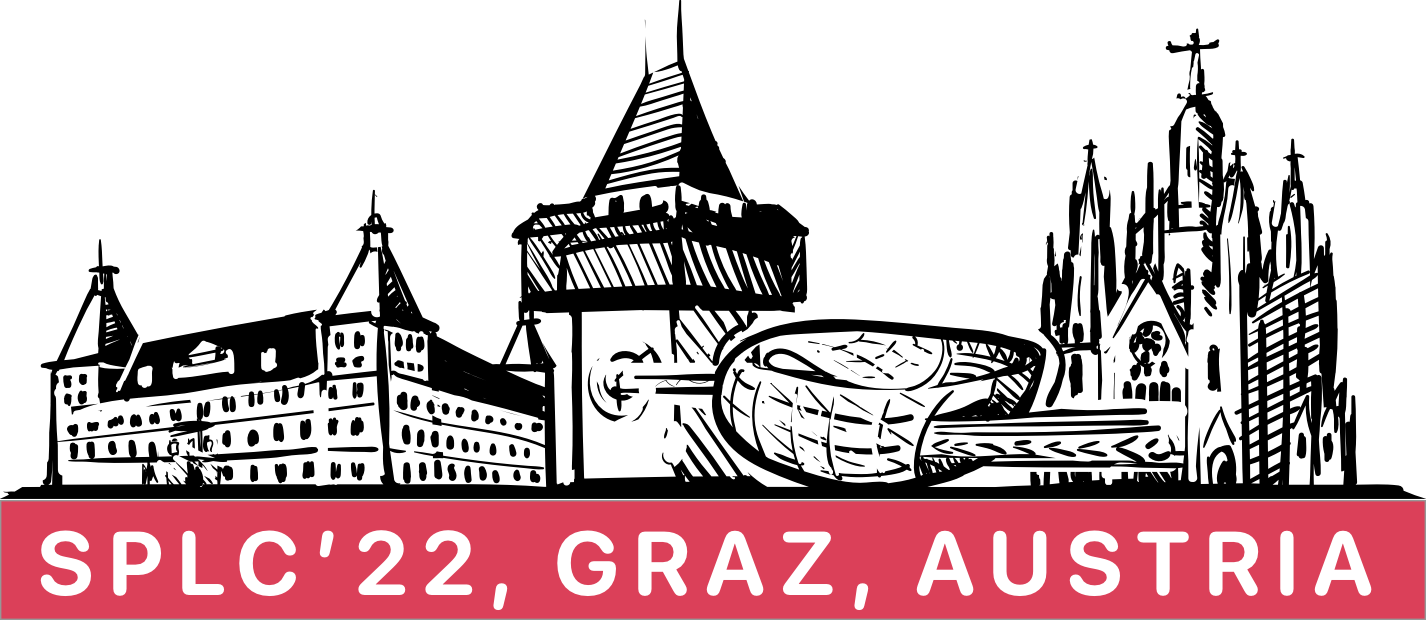This track highlights live demonstrations of product-line tools and practices tackling current industrial challenges.
Introduction
The SPLC 2022 Demonstrations and Tools track provides an opportunity for live demonstrations of academic or commercial systems and software product-line tools. Accepted demonstrations and tools will be presented within the main conference session (using a mix of slides and the running tool) and at demo booths during a dedicated session or breaks and on-demand.
Important Dates
Paper submission: June 14, 2022.Notification: July 1, 2022.Camera-ready papers: July 7, 2022.- Main Conference: September 14-16, 2022
Topics
Areas of interest include, but are not limited to tools supporting:
- feature modeling,
- variant management,
- validation and verification,
- product derivation and generation,
- product-line testing and further analyses,
- measurement and optimisation of non-functional properties of product lines,
- language product lines.
Or simply any tool that supports dealing with variability or configurability in different domains such as IT, software-intensive and cyber-physical systems, Web and Cloud-based systems (incl. (micro) service-oriented systems), Internet of Things, consumer electronics, automotive, automation, software ecosystems and multi-product lines, etc.
Submission/Publishing
Demonstration and tool papers must present either a new tool, a new tool component, or novel extensions to an existing tool. Tools previously shown at SPLC should include a specific description of its new features. Tool papers should provide a short description of the theoretical foundations, after which emphasis should be on design and implementation concerns (incl. software architecture and core data structures), closed by the description of experience with realistic case studies. It is strongly encouraged to make the tool publicly available, preferably on the web, even if only for evaluation.
The page limit for all demonstration and tool submissions is four pages, including figures and references, plus at most two pages for an appendix (which will not be published in the proceedings) describing the presentation of the tool or concept during the conference. Submissions must also include a link to a short (max. 5 minutes) video demonstrating the core features of the approach or tool.
Submissions must be in PDF format. The authors should use the ACM Master article template. Latex users should use the “sample-sigconf.tex” template with the “sigconf” option. Authors must place the following latex code at the start of the latex document:
\documentclass[sigconf]{acmart}
\acmConference[SPLC’22]{26th ACM International Systems and Software Product Line Conference}{12–16 September, 2022}{Graz, Austria}
Submissions should be sent using EasyChair: https://easychair.org/conferences/?conf=splc2022
At least one author of each accepted submission must register and attend SPLC 2022 for the paper to be included in the proceedings.
Evaluation
At least three demonstrations and tools committee members will review each submission. The criteria for evaluating a submission include:
- the relevance of the proposed demonstration to the SPLC audience,
- the technical soundness of the demonstrated tool,
- the originality of the submission’s underlying ideas,
- the quality of the submission’s presentation and its associated video, and
- the degree to which the submission considers the relevant literature.
Chairs
Contact: splc22demotools@easychair.org
Program Committee
- Hugo Araujo, King’s College London, GBR
- Christopher Bull, Newcastle University, GBR
- Rafael Capilla, Universidad Rey Juan Carlos Madrid, ESP
- Diego Cedrim, Amazon
- Ruzanna Chitchyan, University of Bristol, GBR
- Leonardo Da Silva Sousa, Carnegie Mellon University, USA
- Diego Damasceno, Radboud University, NLD
- Barbara Gallina, Mälardalen University, SWE
- Dirk Mutig, Siemens
- Tsuneo Nakanishi, Kyushu University, JPN
- Elena Navarro, University of Castilla-La Mancha, ESP
- Joost Noppen, British Telecom, GBR

